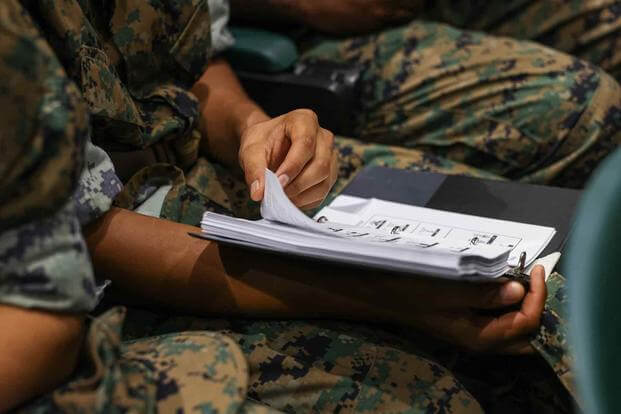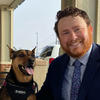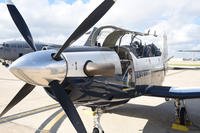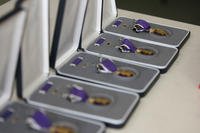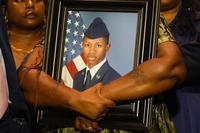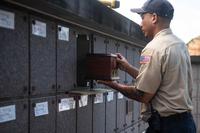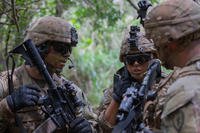The Corps is changing the way Marines learn, and how their instructors -- charged with preparing them for the fleet -- teach.
Yes, that includes getting rid of "death by PowerPoint" and "sage on the stage," popular military colloquialisms describing an old way of instruction. The Marine Corps is ditching them in favor of what it calls "outcomes-based" learning, according to officials at the Modern Day Marine Expo in Washington, D.C., on Tuesday.
The initiative, headed by the service's Training and Education Command, is called Project Triumph. It's been in the works for years, and means the service will focus on the individual Marine's ability to learn rather than cramming instruction into their heads, whether they understand it or not.
Read Next: Air Force Starts to Fly Some Ospreys Again Following Crash that Killed 8 Airmen in Japan
"Instead of teaching them what to think, we're teaching them how to think," Col. Karl Arbogast, the director of policy and standards for Training and Education Command, told a crowd at the exposition. "And in the process, we're making them better decision-makers, or adaptable -- and we're able to deal with changing and challenging environments depending upon the job that they've been asked to do."
Outcomes-based learning has been part of American education for decades. According to the Department of Education, the learning method focuses on the end state for the student, where they can actually demonstrate results of the education they've received.
That differs from traditional methods in a few ways, according to the department. In outcomes-based learning, time is meant to be a resource that can be flexible, depending on the needs of the teacher or student. The curriculum is also based around the end state, rather than the sometimes rigid steps meant to meet that end state.
The Marine Corps, for its part, wants to use this method to create more mentally agile Marines, specifically ones who can solve problems and make decisions on their own, "faster and sooner" than what previous instruction has offered, according to the initiative.
An example Arbogast gave centered on the Infantry Marine Course, or IMC. Instead of having most of the students sitting through classroom instruction and then going to the field, the school changed the ratio of students to instructors so that they can learn in squad-sized groups, a more personal setting. Specifically, one sergeant or staff sergeant was in charge of teaching a group of about 14 Marines.
Arbogast said those Marines would be required to study material before instruction in what he called "self-guided" learning. They would then bring that knowledge to their groups, helping inform the instructor on what they were able to retain on their own before hitting the field for practical applications.
It would be there, in the field, testing those "outcomes" that Marines would develop close-knit relationships, learn about leadership and work together -- skills they would carry into their line units, Arbogast said.
The initiative also takes instructors to task, too -- changing the way they teach to adapt to a "learner-centric" method of education.
"Not every instructor is of the same quality -- not as good in areas but there's some areas that they're better at," Arbogast said. "Just like any student who shows up, sometimes simple things ... maybe they'll take to right away, and other things become a bit more challenging for them, depending on the individual."
Because of that, Marine instructors have to be mentally agile, too, specifically "being able to, as an instructor, [to] recognize that every student is going to learn things a little bit differently, and being able to adapt that for the individual," he said.
Officials said that the old way of teaching, the PowerPoint instructor model, results in a "passive" learning style that does not lead to real, true retention of information.
An example they pointed to was teaching land navigation, a fundamental skill in the military, in which Marines can consume material focused on that skill prior to coming into the classroom, be guided by an instructor based on that pre-loaded knowledge, then take it to the field for practical applications.
"What we know from research is when a learner learns in that passive environment, they're going to go away, and within a few short months, all of that data is gone," Timothy Heck, the deputy officer in charge of the Marine Corps Center for Learning and Faculty Development, told Military.com on Wednesday.
"Whereas in a new methodology, where the learner is directly involved in their own learning, and developing the actual lesson ... during the facilitation, they're going to retain that information far longer down the road," Heck said.
Training and Education Command also created new military occupational specialties, 095X or formal school instructors, which are designated as "exceptional" MOSs -- outside of the Marine's primary job -- so the service can keep better tabs on who is qualified to teach.
Arbogast told reporters Tuesday that the initiative was bolstered by his own experience as a student throughout his career in the Marine Corps.
"It wasn't that long ago when people were instructing me, every teacher that was up there, they didn't care whether I understood the material, what my baseline was, where I had started from," he said. "They didn't care; they just gave the class and walked.
"We're improving so much more than that," he said.
Project Triumph is being developed in conjunction with two other Training and Education Command initiatives, Project Trident and Project Tripoli. Project Trident focuses on supporting Marines in building "close kill webs" in contested environments; Tripoli looks to embed live, virtual and "constructive" assets into exercises across the force.
Together, officials said they make up how Marines train, why Marines train, and where Marines train, respectively.
